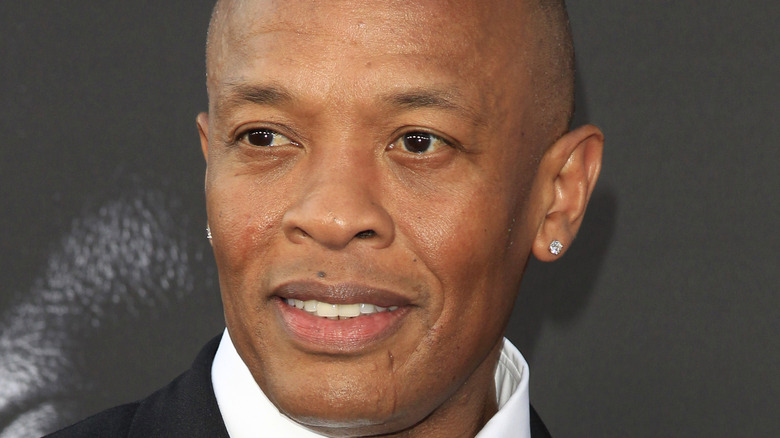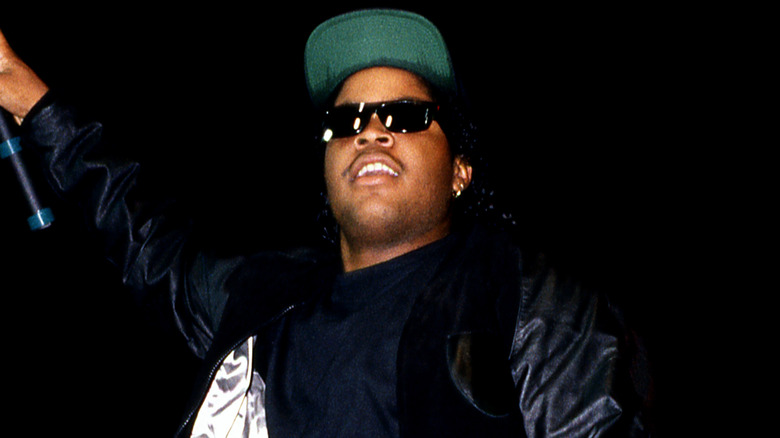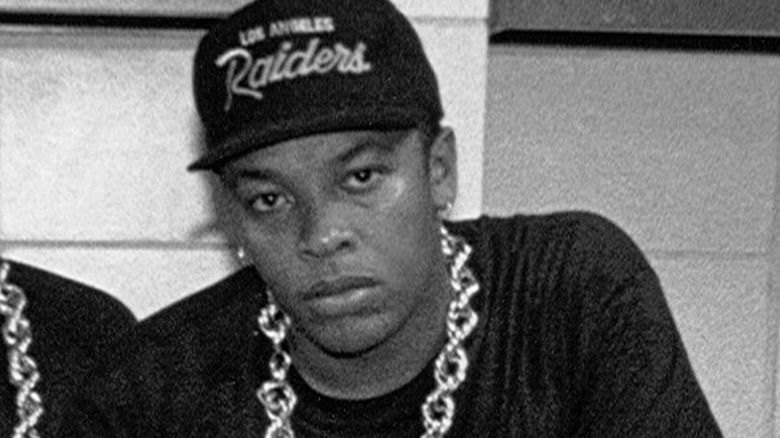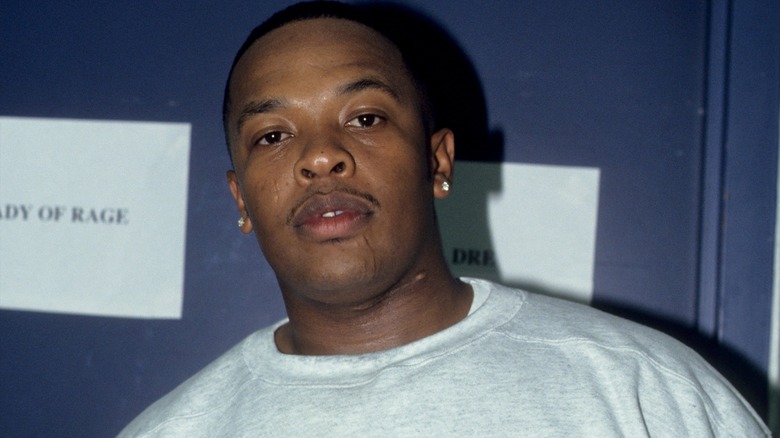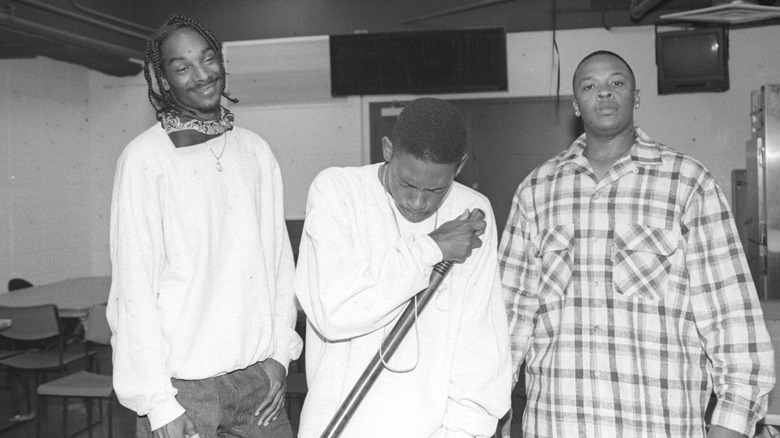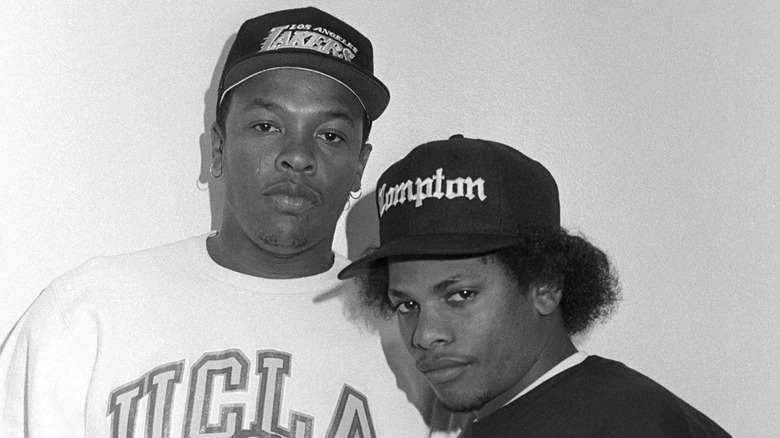Why Did Dr. Dre Leave N.W.A?
They may sound archaic to many a youthful rap fanatic, but N.W.A was one of those groups from back in the day that walked so that practically everyone else who came after them could run. On the other hand, "walk" may not be that good of a term, as they charged into the hip-hop scene with an unprecedented swagger, rapping about the real-life challenges they faced and earning the ire of moral guardians everywhere with their profanity-laced, aggressive lyrics. Sure, some of those lyrics might not have aged that well, but that can be said about many other lyrics from other 1980s musical icons regardless of genre.
You may mostly know him these days as a music executive or as the man behind the Beats headphones, but Andre "Dr. Dre" Young was an integral part of N.W.A's success as gangsta rap innovators in the late '80s and early '90s. Originally part of the "electro-rap" band the World Class Wreckin' Kru, the good doctor mainly contributed the beats (along with Antoine "DJ Yella" Carraby) while Eric "Eazy-E" Wright, O'Shea "Ice Cube" Jackson, and Lorenzo "MC Ren" Patterson did most of the rapping. However, he was out of the band by early 1992, and calling his departure acrimonious would be an understatement.
Dre wasn't the first N.W.A member to leave
On stage, N.W.A presented what appeared to be a united front, performing uncompromising "reality rap" songs informed by their true-to-life struggles as young Black men, including, but not limited to those with law enforcement. They were a breath of fresh air in a nascent hip-hop scene that was still pretty safe ... and would remain relatively safe in terms of the songs that did make it to the pop charts. Behind the scenes, however, things were beginning to get tense following the release of N.W.A's 1988 debut album, "Straight Outta Compton."
For Ice Cube, it was rather suspect that N.W.A's manager, Jerry Heller, and co-member Eazy-E seemed to be the only ones getting rich off the success of "Straight Outta Compton." Cutting the long story short, this led to him leaving the group and launching a solo career in 1989, and anyone who's familiar with the group's story knows what happened next — Cube dissed Heller and his former bandmates on the track "No Vaseline," and he became extremely successful not only as a solo rapper but also as an actor. But by the time the early '90s rolled around, there was another N.W.A member who was feeling increasingly unhappy with his situation and with Eazy, and that was Dr. Dre.
Dre felt Jerry Heller was clearly favoring Eazy-E
Dr. Dre's issues with N.W.A stem from a similar source as Ice Cube, as he was also noticing how Jerry Heller seemed to be prioritizing Eazy-E as the group's main man. "The split came when Jerry Heller got involved," he told Vibe in an interview for the magazine's February 1996 issue. "He played the divide-and-conquer game. He picked one n**** to take care of, instead of taking care of everybody, and that was Eazy. And Eazy was just, like, `Well, s***, I'm taken care of, so f*** it.' "
Vibe was also able to get in touch with Heller, who admitted that he was indeed tighter with Eazy than he was with the rest of N.W.A because the diminutive rapper had become more focused on the business aspect of music. "Dre was a producer and a member of the group," he told the outlet. "Eazy was interested in being Berry Gordy, so more of my time was spent with Eazy."
All of that would point to N.W.A becoming short of another original member following Ice Cube's exit. But that wasn't the only reason why Dre felt it was about time for him to move on from the group he co-founded.
Dre also felt he was being underpaid as a producer
While "Straight Outta Compton" is without a doubt the album that put N.W.A on the map, their 1991 sophomore release can be considered the album that tore them apart. It was during the production of that record that Dr. Dre, already with a foot out of the door due to his issues with Eazy-E and Jerry Heller, got the other foot out with a little help from his friend — a friend named Suge Knight. "I was gettin' like two points for my production on albums. I still have the contracts framed." Dre told Vibe. "I'm not no egotistical person. I just want what I'm supposed to get. Not a penny more, not a penny less."
Talking about Knight's involvement in his exit from N.W.A, Dre explained that the burly NFL defensive lineman-turned rap executive was the one who informed him that he was getting the short end of the stick on his contract with the group's label, Ruthless Records. He added that he had actually been planning to release his own solo music on Ruthless, but he had no choice but to leave because of all the suspicious stuff he was dealing with.
In the film "Straight Outta Compton," Knight (R. Marcos Taylor) is shown with a few of his thugs roughing up Heller (Paul Giamatti) and Eazy-E (Jason Mitchell) and demanding that Dr. Dre (Corey Hawkins) be released from his Ruthless Records contract. These allegations were mentioned in the Vibe story, and when the outlet asked Heller to comment on Knight's claim that he never used physical violence to get ahead in the music business, he had this to say: "I would say he's taking poetic license."
He co-founded Death Row Records after leaving N.W.A
After departing N.W.A (which would disband soon after), Dr. Dre teamed up with Suge Knight to form Death Row Records in 1992, and it didn't take long for the new label to gain some traction in the hip-hop scene. As noted by The Source, Dre's solo debut album, "The Chronic," released late that year, established him as Death Row's flagship artist, and he and Knight were also instrumental in the early success of up-and-coming rappers such as Snoop Dogg (then known as Snoop Doggy Dogg) and Tupac Shakur.
However, Dre and Knight would eventually fall out with each other. The "Straight Outta Compton" biopic shows Dre getting increasingly disturbed by Knight's hair-trigger temper and reputation as a vicious bully. (That scene with Knight and his associates intimidating a man — only clad in his underwear — by unleashing a pitbull on him and firing guns in the air? It really happened, Dre told The Hollywood Reporter.) It was these incidents and others that gave Dre the impetus to split from Knight and leave Death Row. He would soon form Aftermath Entertainment, sign a young Detroit rapper by the name of Marshall Bruce Mathers III (you probably know him better as Eminem), and become massively successful beyond anything he might have imagined when he was forming N.W.A way back in the mid-'80s.
Dre and Knight's feud still rages on to this day, even with the latter behind bars for involuntary manslaughter. But was the rapper/producer-turned-entrepreneur able to squash his beef with Eazy-E before Eazy's untimely death in 1995?
The Dre vs. Eazy feud ended before Eazy fell ill
In a 2015 interview with Rolling Stone a few months prior to the premiere of "Straight Outta Compton," Dr. Dre opened up on Eazy-E's death on March 26, 1995, and revealed that he and his former bandmate were able to somehow bury the hatchet only a few weeks before the latter's hospitalization.
"I was so fortunate to be able to get on the phone with him and talk about maybe putting N.W.A back together, and we chopped it up about old times and what have you and maybe not even two weeks after that, he was in the hospital," Dre recalled. "So the last time I actually saw him, he didn't know I was in the room. He was on life support. I just reached down and whispered a few words in his ear and I think maybe the next day or two he passed away. We had a chance to rekindle it and actually get back in the studio again."
It may have been decades since we last heard new music from N.W.A, but the group has reunited a few times since Eazy's death, albeit for one-off appearances at major events. Brief as it was, Dre joined Ice Cube, MC Ren, and DJ Yella on stage at Coachella in 2016 (via the Los Angeles Times), just days after their induction into the Rock and Roll Hall of Fame.
